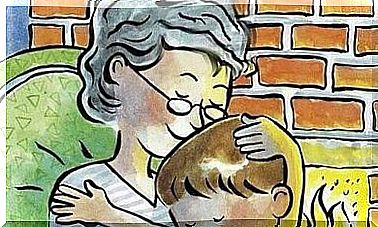7 Normal Behaviors In Babies In The First Months Of Their Lives

During the first months of your baby’s life, you will see some normal behaviors in babies that will provide unique and unforgettable emotions.
Welcoming your newborn baby into your home after the birth is one of the most special and beautiful moments for all mothers.
A baby’s development
In the first few months, the baby’s development is remarkable.
Since birth, babies experience a period of continuous growth and development. It is a time of many discoveries for both the parents and the newborn.
The first few months are a time when the child goes through physical, social, emotional and intellectual developments.
During this process, babies’ behaviors can leave us with some worries and questions.
That is why we have collected 7 common behaviors in babies that you can probably nod in recognition of.
7 normal behaviors in babies in the first few months
1. Deep sleep
In the first days after birth, they go through periods of deep sleep both in the morning and at night.
In fact , they can sleep up to 20 hours a day for the first few days. They only wake up when they are hungry and need to eat.
Sleep is one of the most important routines for their health. It allows them to properly develop the rest of their abilities.
2. They smile while they sleep
While sleeping, babies may unknowingly express a smile.
Keep in mind that the newborn is not aware of its actions. This smile is known as the smile of the angel.

Shouts or sounds (0 to 3 months)
During the first few weeks, the baby may express anger, frustration, hunger, pain, and pleasure through screams and tears.
Trying to understand what the baby’s cry means in the first few months is not an easy task. But their requests are never made for no reason.
During the first few months, they begin to respond to the sound of your voice with various sounds.
4. The crying baby
The baby often cries for the first few months. Crying is their only form of communication.
Their tears can translate into hunger or discomfort. But as we have said before, it is certainly not easy to interpret.
Many parents feel helpless when they see this type of crying. That is why it is important not to panic.
Try to calm the baby by taking it up in your arms and not systematically associating their crying with suffering.
5. They get things in their mouths
The child will try to explore the world by getting things in their mouth. They have an appetite to explore that can be dangerous at times.
Therefore, be sure to keep your baby away from small objects that they may accidentally swallow.

6. The child’s anger
Sometimes babies can show their discomfort or fatigue through anger. There is no need to worry when they are angry from time to time.
Their irritation may be a sign of physical discomfort that needs to be addressed. If you notice a sudden change in their behavior, do not hesitate to consult with your doctor.
7. Use of body language (4 to 7 months)
When the baby is up to 4 months old, they begin to show greater control over their body.
Their eyesight improves, they show greater interest in toys. Toys can be a goldmine for motor and intellectual stimulation.
During their sixth month of life, their hands and feet are more mobile, and the baby therefore begins to use signs to communicate.
They can even try to sit or turn around on their own. It shows the development of strength, balance and coordination.
In the first months after birth, touch and sight are their most important communication tools, which are used in conjunction with their other behaviors in babies.
As they get older, they will show different behaviors that will also be signs of their development.








